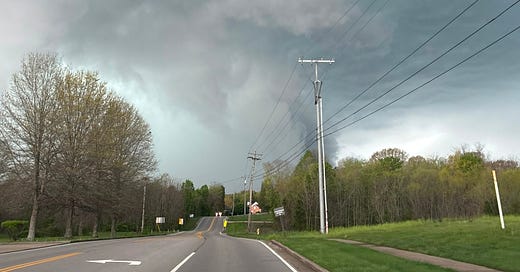I enjoy those movies where a certain tragedy strikes and complete strangers are forced to trust one another and build an unbreakable bond. Community is built rapidly out of necessity. I was sitting in the Subaru dealership the other day and observed those around me. A young white woman with Beats headphones picks at her fingernails as if to uncover something valuable beneath her cuticles. Another young woman, a Black woman, is working at the table with her iPad displayed and notebooks spread out. She is focused, dialed in. A young white man scrolling his phone, dressed in a tucked-in plaid shirt and Dockers, he’ll surely have to return to the office after this. There is a middle-aged white woman lip syncing to Beyoncé’s Halo that is playing on the overhead speaker while working on her laptop. The other two strangers are two gray-haired white men, both scrolling their phones and sipping on the complimentary coffee. I wonder what else they have in common. And what if tragedy struck? What if we all had to shelter in place from a freak tornado or mass shooting? Would we be trauma-bonded and keep in touch? Would we be unlikely friends? The more I think about this vision of community, the more disturbing it becomes. I’m embarrassed, I think very recently I have become a little starved for a true community.
Ashley and I define true community as a group of people who are intentional with one another, not just in time spent together but in how often we cross each other’s minds. Certainly, there is not a day that goes by where you don’t think about someone that you love. That little germ of a thought then sometimes turns to action: a quick text, a phone call on the ride home from work, a marking off of a calendar date, setting aside time. It’s in time that trust and vulnerability are built to form friendship; this is true community. It is not transactional. It is intentional. It is not self-serving. It is self-sacrificial. It is grounded and real. I’ve written here before about the challenges of creating adult friendships that provide true community. Perhaps, we are now in the lull of a five-year effort to build such friendships. I wrote here a couple of months ago about the need and exhaustion of inviting others to play. I’ve decided to take a step back and collect the invitations like shooting stars, hoping one day they will land in my Universe.
Being married with children can quickly become your life. Our schedules are built around what the girls are up to, my work life, and Ashley’s work life. It’s very easy to allow adult friendships to slip through the cracks, as they have their own lives too. They have partners, children, and work. I can confidently say, however, that Ashley and I have never allowed that to stand in the way of pouring the foundation of true community, and it’s increasingly puzzling why others can’t do the same. I’ve also talked about holding others to an unrealistic expectation, I’m working on not. Letting go of expectations while simultaneously letting go of invitation is proving harder than I thought. A kind man older than I responded to a recent block post and said, “Don’t stop inviting.” I’m holding onto this encouragement as wisdom, even if it’s increasingly heartbreaking.
I’m unsure why true community is so hard to come by in adult friendships. Has this always been the case for adults? Did my parents struggle as much as I do? Did they need adult friendships the way I do? They didn’t move in the early 30s to a foreign place with two young children. Most of our closest friends live hours and hours away. I miss entering their homes as if it is my own home. Our physical relationship in its old iteration has ended. It’s now virtual, consisting of FaceTimes, texts, and Instagram memes. It’s not ideal, but it’s better than silence.
I do have hope that one day the inviting will pay off. Hope can be tiring. Maybe that’s why I drift off into daydreams about these tragic events pulling me together with strangers, because I want to be known, and I don’t want it to take years. I’m forgetting the beauty of friendship, I know. The beauty of having a history with people. I struggle with small talk for this very reason: I’m uninterested in the weather and what people do for money. I’m interested in what scares them, what they’re hopeful for in the future. I don’t wanna talk about work. I want to talk about art and hobbies. Is that too much?
I’m no longer worried if I am loved; I’m worried if I am seen. To be seen is to be loved, but can one be loved without being seen? That’s scary. It’s here where I should give a practical next step, but I don’t have one. I am left wondering. Am I the only one feeling this way? It’s okay, if true, I’ve stood alone many times before, and I can stand alone again. It’s less of a pity party and more of a curiosity. Do others feel this way? Will I feel like this forever? How do I change how I feel? Is it a wrong feeling? What have I done to alienate others? How am I becoming a better friend? No answers today, just questions, oh, and hope. I certainly have hope.
-L




